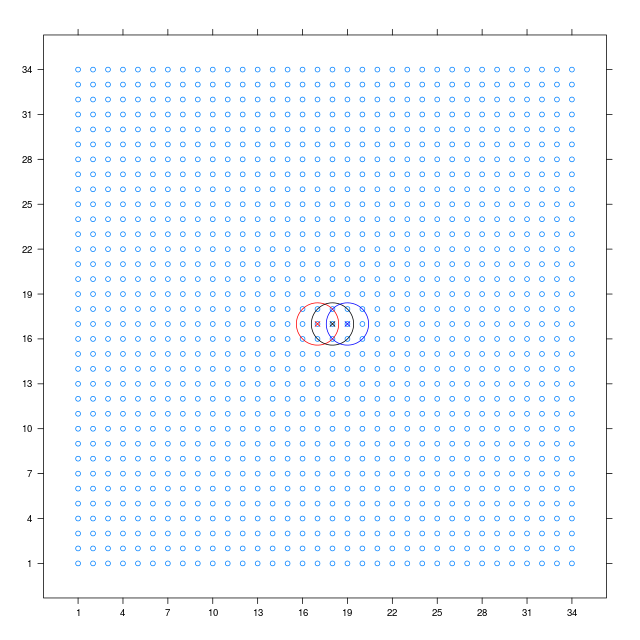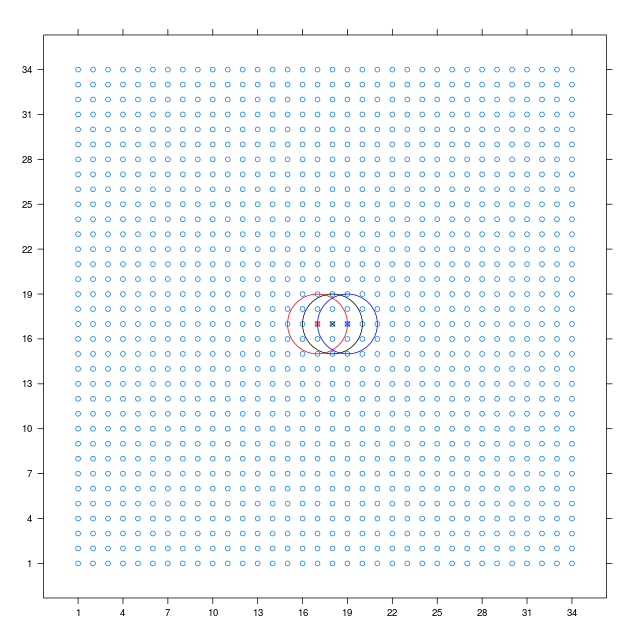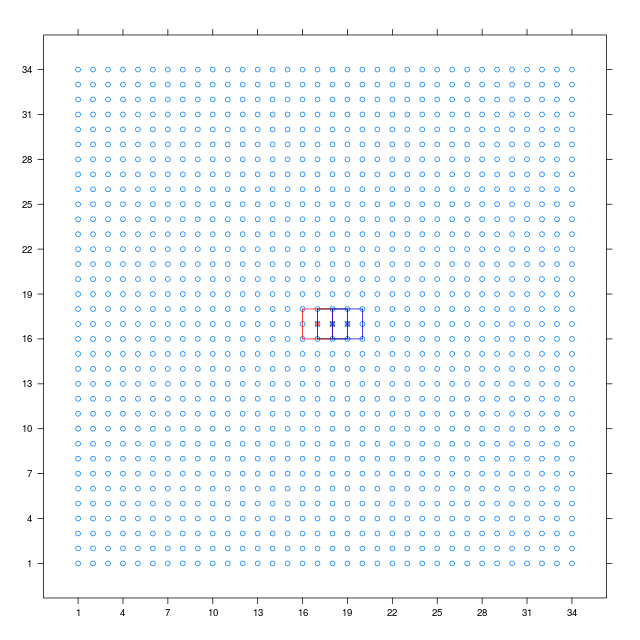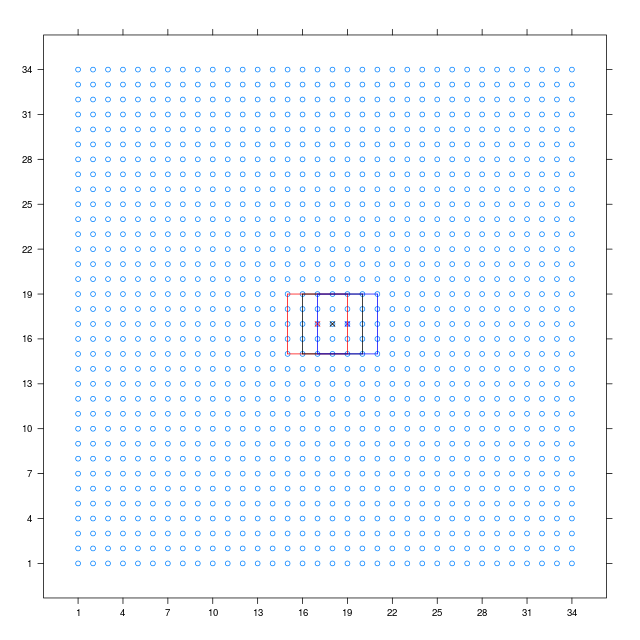1
2
3
4
5
6
7
8
9
10
11
12
13
14
15
16
17
18
19
20
21
22
23
24
25
26
27
28
29
30
31
32
33
34
35
36
37
38
39
40
41
42
43
44
45
46
47
48
49
50
51
52
53
54
55
56
57
58
59
60
61
62
63
64
65
66
67
68
69
70
71
72
73
74
75
76
77
78
79
80
81
82
83
84
85
86
87
88
89
90
91
92
93
94
95
96
97
98
99
100
101
102
103
104
105
106
107
108
109
110
111
112
113
114
115
116
117
118
119
120
121
122
123
124
125
126
127
128
129
130
131
132
133
134
135
136
137
138
| x.range.v = 1:300
y.range.v = 1:300
data.m = expand.grid(x.range.v, y.range.v)
data.m[,3] = rnorm(nrow(data.m))
sq_search_f = function(i, data.m, loc.v, obj, mar){
x = data.m[i,loc.v[1]]; y = data.m[i,loc.v[2]]
near_int = data.m[abs(data.m[,loc.v[1]] - x) <= mar & abs(data.m[,loc.v[2]] - y) <= mar,obj]
if( length(near_int) >= 1){
all(near_int <= data.m[i,obj])
}
else{
FALSE
}
}
library(Rcpp)
sourceCpp(code = '
// [[Rcpp::depends(RcppArmadillo)]]
#include <RcppArmadillo.h>
using namespace Rcpp;
using namespace arma;
// [[Rcpp::export]]
uword sq_search_f_cpp_i_f(int i, NumericVector int_mr, NumericVector Xr, NumericVector Yr, double mar) {
int n = Xr.size();
colvec X(Xr.begin(), n, false),
Y(Yr.begin(), n, false),
int_m(int_mr.begin(), n, false);
double x_loc = X( (uword) i), y_loc = Y( (uword) i);
colvec temp_y = Y(find(abs(X - x_loc) <= mar)),
temp_int = int_m(find(abs(X - x_loc) <= mar)),
int_near = temp_int(find(abs(temp_y - y_loc) <= mar));
uword value = (uword) all(int_near <= int_m((uword) i));
return value;
}
// [[Rcpp::export]]
IntegerVector sq_search_cpp_f(NumericVector int_mr, NumericVector Xr, NumericVector Yr, double mar) {
int n = Xr.size();
ucolvec location_v(n);
for(int i = 0; i < n; i++)
location_v(i) = sq_search_f_cpp_i_f(i, int_mr, Xr, Yr, mar);
return wrap(location_v);
}')
mar = 1
library(snowfall)
start.time = Sys.time()
loc1 = sq_search_cpp_f(data.m[,3], data.m[,1], data.m[,2], mar)
Sys.time() - start.time
start.time = Sys.time()
loc2 = sapply(1:nrow(data.m), function(i) sq_search_f_cpp_i_f(i-1, data.m[,3], data.m[,1], data.m[,2], mar))
Sys.time() - start.time
sfInit(parallel = TRUE, cpus = 8)
sfExport("data.m", "sq_search_f", "mar")
start.time = Sys.time()
loc3 = sfSapply(1:nrow(data.m), function(i) sq_search_f(i, data.m, c(1,2), 3, mar))
Sys.time() - start.time
sfStop()
all.equal(as.vector(loc1), loc2)
all.equal(as.vector(loc1), as.numeric(loc3))
cr_search_f = function(i, data.m, loc.v, obj, mar){
x = data.m[i,loc.v[1]]; y = data.m[i,loc.v[2]]
near_int = data.m[(data.m[,loc.v[1]] - x)^2+ (data.m[,loc.v[2]] - y)^2 <= mar,obj]
if( length(near_int) >= 1){
all(near_int <= data.m[i,obj])
}
else{
FALSE
}
}
library(Rcpp)
sourceCpp(code = '
// [[Rcpp::depends(RcppArmadillo)]]
#include <RcppArmadillo.h>
using namespace Rcpp;
using namespace arma;
// [[Rcpp::export]]
uword cr_search_f_cpp_i_f(int i, NumericVector int_mr, NumericVector Xr, NumericVector Yr, double mar) {
int max_threads_mkl = mkl_get_max_threads();
mkl_set_num_threads(max_threads_mkl);
int n = Xr.size();
colvec X(Xr.begin(), n, false),
Y(Yr.begin(), n, false),
int_m(int_mr.begin(), n, false);
double x_loc = X( (uword) i), y_loc = Y( (uword) i);
colvec int_near = int_m(find(square(X - x_loc) + square(Y - y_loc) <= mar));
uword value = (uword) all(int_near <= int_m((uword) i));
return value;
}
// [[Rcpp::export]]
IntegerVector cr_search_cpp_f(NumericVector int_mr, NumericVector Xr, NumericVector Yr, double mar) {
int n = Xr.size();
ucolvec location_v(n);
for(int i = 0; i < n; i++)
location_v(i) = cr_search_f_cpp_i_f(i, int_mr, Xr, Yr, mar);
return wrap(location_v);
}')
mar = 1
library(snowfall)
start.time = Sys.time()
loc1 = cr_search_cpp_f(data.m[,3], data.m[,1], data.m[,2], mar)
Sys.time() - start.time
start.time = Sys.time()
loc2 = sapply(1:nrow(data.m), function(i) cr_search_f_cpp_i_f(i-1, data.m[,3], data.m[,1], data.m[,2], mar))
Sys.time() - start.time
sfInit(parallel = TRUE, cpus = 8)
sfExport("data.m", "cr_search_f", "mar")
start.time = Sys.time()
loc3 = sfSapply(1:nrow(data.m), function(i) cr_search_f(i, data.m, c(1,2), 3, mar))
Sys.time() - start.time
sfStop()
all.equal(as.vector(loc1), loc2)
all.equal(as.vector(loc1), as.numeric(loc3))
|



